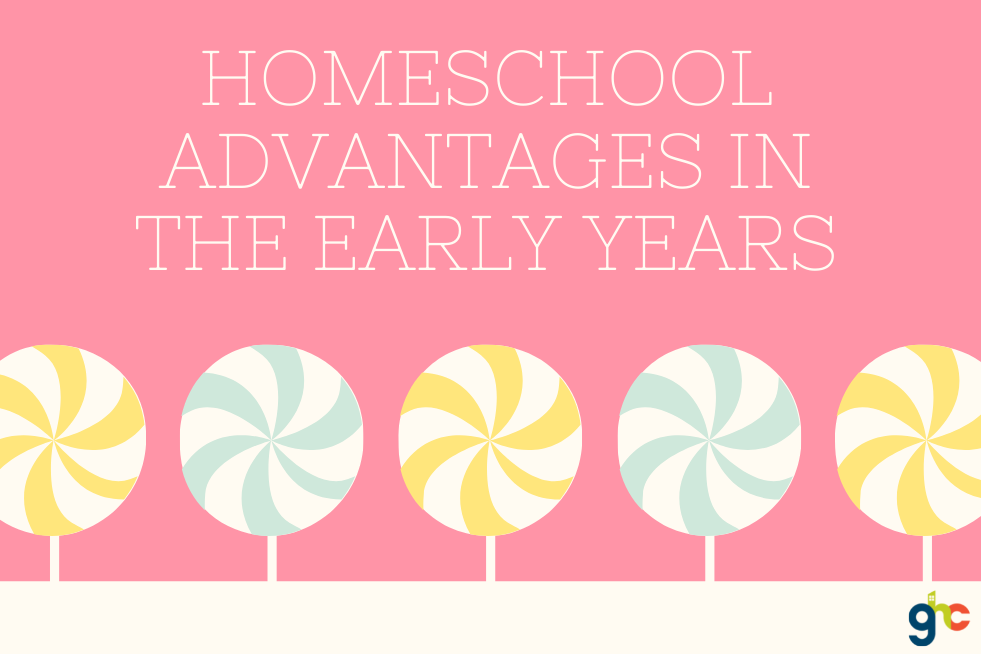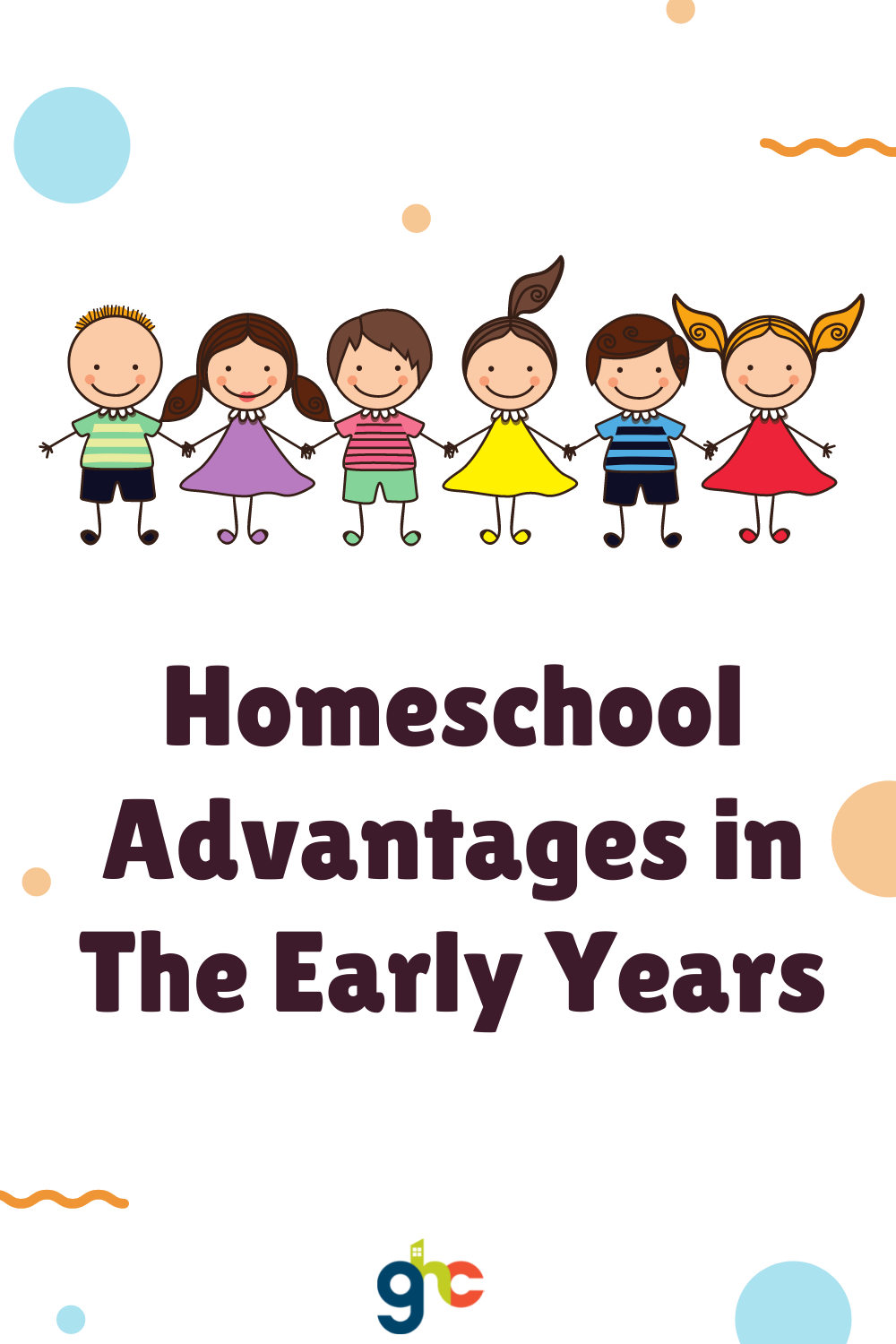
Yesterday, we looked at some general homeschool advantages. Today, we’re going to consider some of the advantages of homeschooling during the early years. For those who never send their child into the public school system in the first place, these advantages may seem commonplace, but I assure you, those who miss this early opportunity missed some advantages as well.
If you’re reading this, considering homeschooling, and your child has not yet reached compulsory attendance age, I urge you to continue your research. The more you find out, the more reasons you will have to go ahead and take that leap. I assure you, it will be well worth it. Another added advantage for you in reading through lists like this one is that you’ll have plenty of answers for those who think you’re doing your child a horrible injustice, especially in the area of social development and social skills. The truth is, you know your child better than anyone, you know (or will know) exactly what you’re doing, and your child's education is your decision, after all.
Homeschool Advantage 1: There’s Less Chance Your Child Will Fall Behind
Thanks to all the public school regulations that lead to no child getting “held back” a grade in school these days, it’s almost impossible for children to “fail”. However, there is a massive possibility of their falling behind. So far behind, in fact, that it’s almost impossible to catch up.
I witnessed this first-hand back when my special needs autistic son was in kindergarten. As a young mother who really wanted to support the school my son attended, I signed on to become a tutor a few days a week. And I’ll never forget what I experienced during that time. Many of the children I worked with, none of whom were special needs students I might add, were still unable to read simple three and four-letter words in the fifth grade. In fact, many of them were brought to tears as I tried to teach them. Finally, I was told that, as long as they spelled the words “phonetically” correct, I should praise them and count the lesson as “adequately completed”.
In the homeschool environment, you have the upper hand in knowing exactly where your child is academically. Better still, instead of waiting until they are “compulsory age” to start teaching them things, you can do lots of fun, stimulating, and educational activities and field trips with your preschoolers, right where they are. This is a great time to combine play and learning for things like color recognition, letter recognition and sounds, pre-writing, and so much more. To them, it’s a game. But you’ll have the benefit of knowing you’re laying a foundation you can build upon in a very short time.
As you get closer to the first grade and are already armed with the knowledge of what you want them to learn, you can begin to focus on areas where you know your child still need help. Strengthening these areas need not be stressful, either, because there are lots of different activities for any subject in these early elementary school years. And I recently heard someone make a great point, alluding to this very fact.
She said that one child may start reading at a very early age, whereas another may not grasp the concept until a few years later. The thing to remember is that by middle school, you’re not likely to be able to pick out which was which. And I think that speaks volumes to the fact that sometimes instead of stressing on where the child “should” be - and let’s be honest, we’re really just comparing them with their public school counterparts at that point - we should just be working with them at their level and at their own personal learning speed.
As you begin to investigate some of the different learning styles children can have, you’ll also find there are homeschooling methods that correlate to them. The Charlotte Mason Method actually teaches a more relaxed learning environment in the first few years of the academic experience that is perfect for children who take longer to grasp certain ideas and theories. I’m sure you’ll find just the right one for your child too. Remember, you have extra time and a flexible schedule to take things at your own pace.
Homeschool Advantage 2: There Is An Immediate Love of Learning
The idea that learning should be fun is completely foreign to some. Having the opportunity to create that atmosphere right from the start is an excellent advantage of homeschooling through these early years. Instead of immediately connecting learning with harshness, strict protocol, and yes, even humiliation in many cases, you can allow your child to find out that learning is nothing at all to stress about!
There are plenty of ways to make learning fun. Using lots of different resources, curriculum, and activities can keep things fresh and maintain your child’s curiosity about new things. Don’t feel like you have to shy away from frequent “breaks” or even doing recess first, sometimes helping them pursue extracurricular activities. For some children, getting all their pent-up energy out right off the bat can really set the stage for focused learning. Others might learn best on the front porch or at the park. You can implement educational television programs, YouTube videos, board games, puzzles in lesson plans to show that there are many approaches to the learning process. These early years are a great time to really harness creativity and imagination, not medicate it and scold it.
One of the best ways to create this early love for learning is being able to model the fact that learning is fun, and something you can even enjoy together. Set aside a specific amount of time for reading, for example, and then read with them. Young children often want to be like their parents, and when they see you doing something and enjoying it, they will often come right alongside you to do the same. In the very early years, you can read aloud to them, and have them read aloud from books that they feel comfortable with. Then as they get older, silent reading will be just as fun and it won’t feel as much like a chore.
Homeschool Advantage 3: Hobbies Are Just as Important as Math & Science
One of the greatest homeschool advantages is the ability to turn your child’s hobbies into enriching activities that work toward educational goals. Music and art are great examples of hobbies that can easily become so much more and will be counted for credit on the transcript as they approach higher education.
For the auditory learner, adding music, rhyme, and patterns that come with listening to and learning music is an excellent way not only to learn but also to calm the mind. Music has often been used in therapy for its effect on the mind, so if you think your child might learn best this way, it’s well worth the effort to do a bit more research on the topic.
In the same way, art works well for those right-brained visual learners. The addition of art can help in more ways than you might think, and across the entire gamut of subjects. As an educator, I have used art to enrich mathematics, science, and social studies. We’ve used it after field trips as a part of an activity, and we’ve even used it to create storyboards and scripts in language arts. You can literally let your imagination lead the way here.
Music and art are both known to stimulate the imagination, enhance cognitive function, aid in critical thinking, and enrich life skills and social skills. It gives additional opportunities to develop problem-solving skills, develop goal-setting, self-discipline, self-confidence, and self-esteem. And when fostering these arts with multiple children, it also helps them learn how to work as a team, take turns, and respect others.
My husband and I were worship leaders at our church, so our children were able to see a love of music from a very personal level. While our daughter did work with both guitar and piano and learned to sing with amazing skill, our son went on to near-mastery of the guitar and drums. As a high-functioning autistic, with obsessive-compulsive tendencies, this helped steer him in a positive direction and give him something very worthwhile to focus on, even on his “bad days”.
Homeschool Advantage 4: Your Child’s Self-Esteem Will Be Safe
The amount of ridicule, bullying, and peer pressure that children go through in even the earliest years of a traditional school is phenomenal. The worst part is that children in preschool, kindergarten and the first few years of elementary school might not know how to verbalize what they’re going through. It may appear, at first, like your child is having behavioral issues, they may diagnose it as ADHD or some other learning disability, or they may even say the child is “defiant” because they act out instead of verbalizing the true issue.
By the time the real problem factor is discovered, if it’s ever discovered at all, your child’s self-esteem can suffer greatly. And worse still, it often doesn’t recover for many years after. Instead, the difference that can be made by homeschooling during these years instead is a homeschool advantage that just goes on and on. Better self-esteem helps to build better relationships with family and friends and builds self-confidence too. A child who is free from the stressors of bullying and peer pressure can bloom into an amazing young person whose strengths and talents can really shine through!
Homeschool Advantage 5: You’ll Be Able To Schedule According to What Works Best for Your Family
If you’re like me, you have one child that’s up with the chickens and another that that goes to bed about the same time. Of course, they’re grown now, but when they were younger they were the same way. Some kids just aren’t really “morning people”. I do believe children should be taught to adhere better to schedules because life simply demands it sometimes, but what’s the loss if they sleep an hour longer in the morning than public school students? If it helps them work better through the first half of the day, I’m all for it!
You can also adjust the schedule to allow more time for lunch, breaks, recess, or anything else you find will make the day run more smoothly. It may sound a little unbelievable, but some children even prefer to work longer on some subjects than others. My daughter could do science for two or three hours a day. She loved it that much, and many times, I simply let her have extra time on my computer to research as deeply as she wanted about whatever we were studying. And that’s an excellent homeschool advantage, especially in those early, formidable years.
Homeschool Advantage 6: You Can Learn Important Lessons On the Go
Kids love to get out and go. Whether it’s to the park, the grocery store, or even just a stroll around the block. The good news is, there is a natural curiosity in young children that breeds questions. Questions deserve answers. And in offering those answers, you can utilize the moment for teaching. To your homeschooled child, they’ve just had a question answered and been validated all at the same time; both integral parts of a child’s life. But you know they have probably just learned something they’re not likely to forget.
When you begin to see your child’s questions as pathways to learning, you can turn just about any outing into an excellent learning opportunity.
Be sure to check back tomorrow, when we’ll discuss the advantages of homeschooling middle and high school-age children!

In Closing
To get a jump start on your own homeschooling plans, you should plan to attend a Great Homeschool Convention. With seven regional conventions, there’s sure to be one near you. There, you’ll find an abundance of vendors with a variety of curriculum choices, resources, and information that can help turn your first year of homeschooling into a complete success. You’ll also hear some amazing speakers and get to meet other homeschoolers, just like yourself.
If you are planning to travel very far to attend the convention, we’ve made arrangements for hotel discounts to help with the overall experience. We also offer military discounts and free admission to active clergy members.
To find your nearest Great Homeschool Convention, CLICK HERE.
For a list of speakers, CLICK HERE.
To register now, CLICK HERE.
To read more exciting blog content, CLICK HERE.
And remember, Great Homeschool Conventions are: Equipping… Encouraging… FUN!
